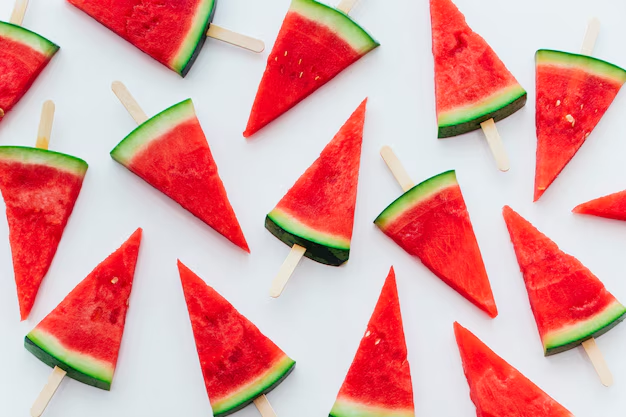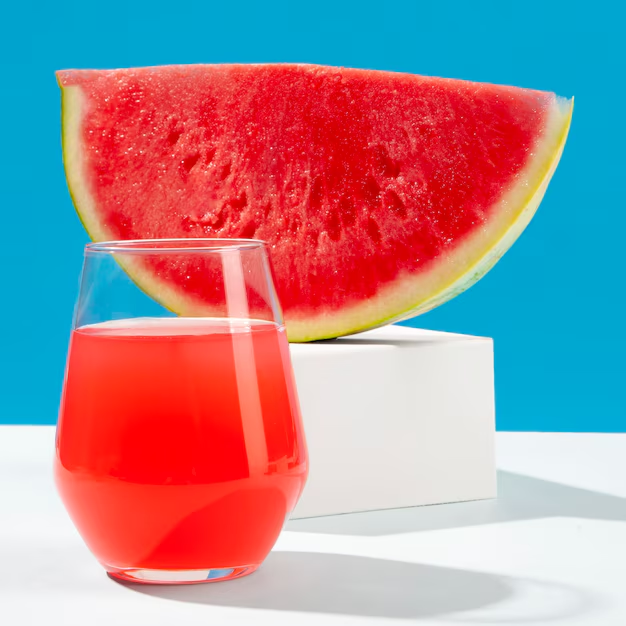Is watermelon truly a sugary fruit, or does it fit into a balanced diet? This question often arises because watermelon tastes sweet and refreshing. Many people assume that its sweetness comes from high sugar content.
However, is this perception accurate? Watermelon is not only a favorite summer fruit but also a nutritional powerhouse. This article will explore watermelon’s sugar content, its overall nutritional profile, and its impact on health. By the end, you’ll have a clear understanding of whether watermelon can be part of a healthy lifestyle, even for those watching their sugar intake.
What Determines Sugar Content in Fruits?
Fruits contain natural sugars that give them their sweetness. These include:
- Fructose – The primary sugar in fruits.
- Glucose – A simple sugar that quickly raises blood sugar.
- Sucrose – A combination of glucose and fructose.
The amount of sugar in a fruit depends on its ripeness, variety, and growing conditions. For example, riper fruits tend to have higher sugar content.
Comparison of Sugar Content in Watermelon vs. Other Fruits:
- Watermelon (1 cup diced) – 9.5 grams of sugar
- Banana (1 medium) – 14 grams of sugar
- Apple (1 medium) – 19 grams of sugar
- Grapes (1 cup) – 23 grams of sugar
While watermelon tastes sweet, its sugar content is lower than many other fruits.
Why Is Sugar Content a Concern for Some People?
Sugar intake is a concern for individuals monitoring their blood sugar levels. Natural sugars in fruit affect blood sugar, but they act differently than added sugars in processed foods.
Groups who need to monitor sugar intake include:
- People with diabetes – To manage blood sugar levels.
- Individuals on low-carb or ketogenic diets – To limit carbohydrate intake.
- Those watching calorie intake – Sugar contributes to total calorie consumption.
Understanding sugar content helps these groups make informed choices.
Does Watermelon Have a Lot of Sugar?

Watermelon is surprisingly low in sugar compared to its sweet taste. One cup of diced watermelon (about 150 grams) contains:
- 9.5 grams of sugar
- 11 grams of carbohydrates
In comparison to other popular fruits:
| Fruit | Sugar Content (per serving) |
| Watermelon (1 cup) | 9.5 grams |
| Banana (1 medium) | 14 grams |
| Apple (1 medium) | 19 grams |
| Blueberries (1 cup) | 15 grams |
| Grapes (1 cup) | 23 grams |
This shows that watermelon contains significantly less sugar than bananas, apples, and grapes.
Is Watermelon High in Sugar Compared to Other Fruits?
No, watermelon is not high in sugar. Compared to fruits like grapes and apples, it is a lower-sugar option.
The sweetness of watermelon comes mainly from fructose, a natural sugar that the body processes differently than added sugars. Its high water content (over 90%) also dilutes the sugar concentration, making it a lighter choice for those watching their intake.
Is Watermelon Safe for People with Diabetes?
Watermelon and Glycemic Index (GI)
The Glycemic Index (GI) measures how quickly a food raises blood sugar levels. Foods with a high GI cause blood sugar spikes, while low-GI foods provide a steady release of energy.
- Watermelon has a Glycemic Index (GI) of 72, which is considered high.
- However, the Glycemic Load (GL) is only 5 for a standard serving (1 cup).
What’s the difference?
- GI shows how fast sugar is released into the blood.
- GL considers both sugar content and serving size.
Since watermelon is low in total carbohydrates, its Glycemic Load remains low despite its high GI.
Does Watermelon Raise Blood Sugar?
Watermelon can slightly raise blood sugar, but its impact is mild when eaten in moderation. Factors affecting blood sugar response include:
- Portion size – Small servings are better for diabetics.
- Food pairing – Combine watermelon with protein or healthy fats to slow sugar absorption.
Tips for Portion Control:
- Stick to 1 cup of diced watermelon per serving.
- Eat watermelon as part of a balanced meal, not alone.
Is Watermelon Good for Diabetics?
Yes, watermelon can fit into a diabetic meal plan when consumed in moderation. It provides hydration, vitamins, and antioxidants without excess sugar or calories.
Benefits for diabetics include:
- Low Glycemic Load – Less impact on blood sugar levels.
- Nutrient-dense – Contains vitamins A and C, important for immune health.
- Hydration – Over 90% water helps maintain hydration, essential for blood sugar balance.
However, portion control remains key. Always monitor blood sugar levels when introducing watermelon to your diet.
Watermelon Nutrition Facts
Watermelon is a nutrient-dense fruit. Here’s the breakdown for 1 cup of diced watermelon (150 grams):
- Calories: 46
- Carbohydrates: 11 grams
- Sugars: 9.5 grams
- Fiber: 0.6 grams
- Protein: 1 gram
- Fat: 0.2 grams
- Water Content: 92%
Vitamins and Minerals:
- Vitamin A – Supports eye health and immune function.
- Vitamin C – Boosts immunity and promotes skin health.
- Potassium – Helps regulate blood pressure and fluid balance.
Low-Calorie and Low-Fat Benefits
Watermelon is one of the best low-calorie, low-fat fruits. Despite its sweet taste, it’s very light:
- Only 46 calories per serving.
- Contains almost no fat or cholesterol.
This makes watermelon a guilt-free option for weight management. Its high water content keeps you full and hydrated, reducing cravings for sugary snacks.
Other Benefits:
- Helps cool down the body during hot weather.
- Provides antioxidants like lycopene, which supports heart health.
Health Benefits of Watermelon

Hydration Benefits
Watermelon is over 90% water, making it one of the most hydrating fruits. Staying hydrated is essential for overall health. Water supports body temperature regulation, nutrient transport, and toxin removal.
In hot weather or after exercise, the body loses water through sweat. Watermelon helps replenish lost fluids and electrolytes naturally. Unlike sugary drinks, it provides hydration without excess calories or additives.
For individuals who struggle to drink enough water, snacking on watermelon is an excellent alternative. It’s light, refreshing, and helps keep dehydration at bay.
Additionally, the electrolytes in watermelon, like potassium, aid in maintaining the body’s fluid balance. This makes watermelon a perfect choice to quench thirst while supporting hydration goals.
Rich in Antioxidants
Watermelon is packed with powerful antioxidants that protect the body from oxidative stress. The main antioxidants in watermelon include:
- Lycopene – A pigment responsible for the red color in watermelon. Lycopene reduces inflammation and helps fight free radicals that damage cells. Studies show it supports heart health and lowers the risk of certain cancers.
- Beta-carotene – This antioxidant converts to vitamin A in the body, improving eye health and boosting the immune system.
- Vitamin C – A well-known antioxidant that strengthens immunity and promotes healthy skin by fighting signs of aging.
These antioxidants help neutralize harmful molecules in the body. This reduces inflammation, improves overall health, and slows down cellular damage. Adding watermelon to your diet ensures you get a natural dose of antioxidants.
Heart and Skin Health
Watermelon contributes to heart health due to its rich nutrient profile. The lycopene in watermelon lowers bad cholesterol (LDL) levels and improves blood vessel function. This reduces the risk of heart disease over time.
In addition, watermelon is a great source of potassium. Potassium helps regulate blood pressure by balancing sodium levels in the body. Regular consumption of potassium-rich foods like watermelon supports a healthy cardiovascular system.
When it comes to skin health, watermelon provides two important nutrients:
- Vitamin C – Promotes collagen production, which keeps skin firm and youthful.
- Hydration – Keeps skin moisturized, glowing, and healthy.
The antioxidants in watermelon also protect the skin from sun damage and aging caused by UV exposure. Including watermelon in your diet can help you achieve a radiant complexion and better heart health.
Are There Low-Sugar Fruits You Should Consider?
While watermelon is relatively low in sugar, there are other low-sugar fruits that may fit your diet:
- Berries (strawberries, raspberries, and blackberries): Contain 5–7 grams of sugar per cup. They are high in fiber, antioxidants, and vitamins.
- Cantaloupe: Contains about 8 grams of sugar per cup and is rich in hydration and vitamin A.
- Peaches: Have only 8 grams of sugar in a medium-sized fruit and offer vitamin C and fiber.
These fruits are excellent alternatives for those looking to reduce sugar intake. Compared to watermelon, they provide similar health benefits but with slightly lower sugar content.
If you are managing diabetes or following a low-carb diet, rotating between watermelon and these fruits can help you stay on track. They are nutrient-dense, hydrating, and delicious options.
FAQs
Is Watermelon High in Sugar?
No, watermelon is not high in sugar. It contains only 9.5 grams of sugar per cup, which is less than many other fruits.
How Much Sugar Is in One Cup of Watermelon?
One cup of diced watermelon contains approximately 9.5 grams of sugar and 11 grams of carbohydrates.
Can Diabetics Eat Watermelon?
Yes, diabetics can eat watermelon in moderation. Stick to 1 cup per serving to control blood sugar spikes.
Does Watermelon Cause Weight Gain?
No, watermelon is low in calories and fat. One cup has only 46 calories, making it ideal for weight management.
Is Watermelon Low in Sugar Compared to Other Fruits?
Yes, watermelon has less sugar than bananas, apples, and grapes. It’s a great low-sugar fruit option.
Conclusion
Watermelon may taste sweet, but it’s surprisingly low in sugar compared to many other fruits. With only 9.5 grams of sugar per cup and a low Glycemic Load, it’s a healthy choice even for those monitoring blood sugar levels. Watermelon is not only refreshing but also packed with hydration, vitamins, and antioxidants.
For people with diabetes or those watching their sugar intake, moderation and portion control are key. Including watermelon in your diet can bring both nutritional benefits and summer enjoyment.

